Updated on Mar, 02 2025 08:07 IST
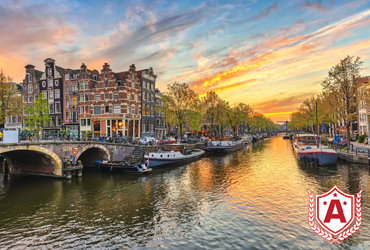 The Netherlands is located in Northwestern Europe. It is bordered by Belgium and Germany and is known as the land of windmills and flowers. The Netherlands is known worldwide for its innovative education methods. If a student decides to pursue education in the Netherlands, it is confirmed that they will experience contemporary fashion, visionary architecture, and loads of street markets. The Netherlands also offers the students the most active nightlife and social scenes, making the place an enjoyable and student-centric city. There are also many tourist sites and famous museums within Europe for students who are not into bars and loud music. There is always something extraordinary for every student to experience in the Netherlands. This place is ranked among the highest in the list of the best countries to study abroad, as it offers access to the best quality teaching and achieves the best career goals. 77 renowned education institutions offer more than 2,000 study programs in English in the Netherlands. Most study programs are introduced for international students who prefer to study abroad. Students will not only be a part of renowned international student bodies, but the educational institutes in the Netherlands are the best worldwide.
The Netherlands is located in Northwestern Europe. It is bordered by Belgium and Germany and is known as the land of windmills and flowers. The Netherlands is known worldwide for its innovative education methods. If a student decides to pursue education in the Netherlands, it is confirmed that they will experience contemporary fashion, visionary architecture, and loads of street markets. The Netherlands also offers the students the most active nightlife and social scenes, making the place an enjoyable and student-centric city. There are also many tourist sites and famous museums within Europe for students who are not into bars and loud music. There is always something extraordinary for every student to experience in the Netherlands. This place is ranked among the highest in the list of the best countries to study abroad, as it offers access to the best quality teaching and achieves the best career goals. 77 renowned education institutions offer more than 2,000 study programs in English in the Netherlands. Most study programs are introduced for international students who prefer to study abroad. Students will not only be a part of renowned international student bodies, but the educational institutes in the Netherlands are the best worldwide.
If you’re searching for a bachelor’s, diploma, master's, or Ph.D. in the Netherlands, then be assured that it has got everything. There are many opportunities that are waiting for the students after they have completed their education programs in the Netherlands. There are various professional fields students will be able to enter or continue higher studies in other international universities. Moreover, when pursuing education in the Netherlands, students will benefit from the best transport links. It helps students to travel and go sightseeing in various popular cities in Europe.
There are many other reasons that let students study in the Netherlands:
Education System: The Universities located in the Netherlands are funded by the state and divided into two categories: Universities of applied sciences and Research universities, There are 41 universities of applied sciences and 14 research universities in the Netherlands. Universities of applied sciences help students prepare for a specific professional field, and research universities offer better research-intensive education. There are also various private colleges and universities apart from state-funded universities. Since 2002, the Netherlands has offered a three-cycle system of bachelor in the first cycle, a master’s in the second cycle, and Ph.D. in the third cycle. The academic year in the Netherlands starts from September till May and June next year. Many courses and institutions have enrollments throughout the year. Some of the top universities in the Netherlands are the Delft University of Technology, the University of Amsterdam, Leiden University, and Utrecht University. Some of the best colleges in the Netherlands are located in cities like Nijmegen, Leiden, and Wageningen. Maastricht and Groningen. Some of the popular courses in the Netherlands are engineering, aviation and space teaching, history, art, and hotel management. The Netherlands is known as the safest metropolitan area. The crime rates in this place are also fairly low, particularly in Amsterdam.
Weather: The temperature is also mild in the Netherlands, with moderate winters and cool summers throughout the year. Since the Netherlands is geographically small, the variation in climate from region to region is also little. The average temperatures in winters range from 2 degrees to 6 degrees. During the summers, the temperature ranges from 17 degrees to 20 degrees.
Lifestyle: Being an international student in the Netherlands is a really exciting matter. Dutch people are friendly and fond of fine art, football, drinks, and good food, similar to most Europeans. There will be a major culture shock for students in the beginning who come from India. Gay rights and lesbians are respected, consumption of soft drugs is also legal, and there is no discrimination made. Society is respected by everyone and is highly progressive.
Accommodation: Students firstly need to live with a private landlord or university-managed accommodation. University-managed accommodation gives the self-catered or catered option. There are many benefits of catered accommodation as it offers the students meals being cooked. Wherever the students live in the Netherlands, knowing the contractual responsibilities and rights is mandatory.
Orientation: Students need to attend the mandatory week to ensure that students arrive before it starts. Students will be introduced to various rules of the university and its services.
Activities: Apart from sports, colleges and universities offer extracurricular activities with many experiences. Various colleges offer drama, music, literary societies, and science. There will also be opportunities for leisure activities and outdoor education.
The Netherlands is known as Holland and part of Mainland Europe. Some of the top courses and programs in the Netherlands are
M.Sc in Urbanism
M.A in Literary Studies
B.A in Hotel and Event Management
B.Sc in Bachelor’s Soil, Water and Atmosphere
M.Sc in Econometrics
B.Sc in Horticulture and Business Management
Bachelors in Marketing Management
Master Degree in Linguistic
B.Sc in Data Science
M.Sc in Plant Sciences
BBA in International Business
B.Sc in Business Administration
BA in Management with Emphasis in International Business
BBA in International Business Innovation Studies
BA in International Fast Track
MA in Master of Science in Business Administration
BA or B.Sc in Liberal Arts and Sciences
M.Sc in Urban Water and Sanitation
Masters in Contemporary Theatre, Dance and Dramaturgy
Some of the renowned colleges and universities in the Netherlands are:
Wageningen University and Research
Utrecht University
University of Amsterdam
Leiden University
Delft University of Technology (TU Delft)
Erasmus University Rotterdam
Vrije Universiteit Amsterdam
University of Groningen
Radboud University
Maastricht University
The Holland Scholarship is dedicated to international students from EEA or outside the European Economic Area willing to pursue Bachelor’s Degree or Master’s Degree at universities in the Netherlands.
Some of the scholarships available for international students in the Netherlands are:
Radboud Scholarship Programme for International Students
Orange Knowledge Programme in The Netherlands
Amsterdam Merit Scholarships for Excellent International Students
University of Twente Scholarships (UTS)
The universities in the Netherlands offer students more than 2,800 courses in English. Prospective students can choose from a wide range of programs for perfect study. Here are some tricks and tips that will help students to select and filter a few programs that are the best fit for their goals of students. There are 2 major ways to select study programs in the Netherlands. Students need to explore the websites of the university and browse through the educational portal databases. If students have found the university that they would like to attend, then it is better to navigate the websites and find the appropriate study program. And if students are not sure of which study program to choose from, then the educational portal database of the university will allow students to compare between programs before making the decision.
Select A Degree: You can select the programs by applying the degree filter on college or university websites. There are two main degrees that most international students choose from when going to the Netherlands for studies, i.e. bachelor's or master's degree. Universities in the Netherlands also offer LLM or Master Of Laws, MBA or Master of Business Administration, and Ph.D. or Doctor Of Philosophy programs, short courses, and preparatory programs.
Bachelor’s Programs: These programs are highly suitable for aspirants who have done their high school or have enrolled in college or university in their home country. Bachelor’s programs usually require 3 to 4 years for completion. There are also a few bachelor’s courses that require 1 or 2 years for completion. These are the “top-up” programs that are specifically for Bachelor’s students who have completed a few years at another college or university.
Master’s Programs: This study program is available for aspirants who have already completed their bachelor’s degrees. The maximum of the master’s programs at the universities in the Netherlands has a duration of 1 year. There are also master’s programs that have a duration of 2 years. Both the bachelor’s programs and master’s programs can either be applied or academic. Applied programs prepare students for the perfect professional career and are offered by universities of applied sciences. Academic programs focus on scientific research and are offered by research universities.
MBA and LLM programs: MBA and LLM programs are specialized master’s programs in the fields of business administration and law. MBA and LLM programs have a duration of 1 or 2 years. The requirements for application for an MBA or LLM include work experience or a master’s degree in the field of expertise.
PhD. programs: This program is generally offered by research universities for aspirants who already have a master’s diploma. Ph.D. programs are available as research positions.
Preparatory Courses: These courses prepare aspirants for bachelor’s study or master’s study. Preparatory courses have the key goal of improving the proficiency level in the English language. The IELTS test result must be above 6.0, or else the student won’t be accepted for a bachelor's degree in the Netherlands. There are two main options to meet this requirement, either to study English properly or retake the IELTS test until the passing marks are obtained.
In Particular, there are two ways to apply to universities in the Netherlands.
Universities in the Netherlands accept applications through an online enrolment system. For example, universities like The Hague University, NHTV Breda University, and Holland University accept applications online.
There are also some universities in the Netherlands that accept applications via their website. These universities make use of their own modules of online applications. For example universities like Hanze UAS, Groningen, and Leiden University accept applications via their websites.
Students need to make their account on the college website having the basic information like scanned copies of all the documents and pay the application fees. All pieces of information about the admission process and its different stages will be informed to the students via this account. All colleges and universities are also required to pay the application fees when students are applying. The number of fees differs as per the college and the course.
The common steps to apply to colleges and universities in the Netherlands are:
Search for the preferred colleges and courses.
Contact colleges and universities and make sure to visit their websites for more information.
Jot down the list of colleges and colleges.
Take the IELTS, and TOEFL examinations to test your language proficiency
Apply to the colleges of your interest
Students need to appear for video interviews of the universities or colleges that have been shortlisted.
Apply for a student visa if accepted
Motivation Letter- A motivation letter is the introduction of the student to the university or college and also to the admission officers. Motivation letters are written in the first person and it clearly describes the reason for applying to a specific college or university. The motivation letter needs the reason for applying to the university or college to be highlighted and why the college should accept that candidate. The style of writing the motivation letter could be formal or casual, but it should reflect the personality of the student.
Essay- prospective students need to submit the essays. These are essential parts of the admission process of the university. Aspirants might be required to write 1 or 2 essays and also some optional essays. Some of the common topics of essays include strengths and weaknesses, career aspirations, reasons to consider a specific college or university, experiences, and skills.
LoR- LoR is written by third parties describing the characteristics, qualities, and capabilities of the prospective candidate to recommend the candidate to the university or college in terms of the ability of the individual to perform a specific function or task. Your third party could be a direct manager, professor, etc.
Before students get a student visa in the Netherlands, non-EU citizens require to obtain an MVV which is the Entry Residence Permit. MVV is applied for by the college or university, which candidates are enrolled. Since most of the colleges and university programs are more than 90 days in duration, students need the Temporary Residence Permit which is known as VRV.
Documents required to apply for the visa in the Netherlands are:
Copy of birth certificate
Valid passport details
Copy of fee payment details
Health insurance in the Netherlands
Acceptance letter from the university
Photographs
Proof of financial capability
Students need to take the Dutch health insurance separately and apply for a work permit if students have a plan of doing part-time jobs or internships during their study time in the Netherlands.
The documents required to study in the Netherlands are:
Birth certificate
Two photographs
Valid passport
Completed visa application form
Visa application fee (174 EUR)
Academic transcripts
Financial proof for the entire period of study (around 870 EUR/month)
Travel and health insurance
Biometric information
Tuberculosis test (required for citizens from some countries)
Photocopies of all the original documents
Official letter from the academic institution in the Netherlands
Complete study plan
The education system in the Netherlands is much similar to any other countries in Europe. But there are also some variances that depend from course to course.
| Level of Studies | Eligibility* | Aptitude Tests** (Recommended not mandatory) | English Language Test |
|---|---|---|---|
| Bachelors Courses | Secondary School Certification (12th) | - | IELTS / TOEFL |
| Master's Courses | Bachelor's Degree (4 years) | GRE / GMAT | - |
Most of the colleges and universities in the Netherlands accept the criteria mentioned above. But the criteria mentioned above are not mandatory and may vary depending on the study program selected. Some universities might not accept the marks of the 12th standard for a specific bachelor’s course. On the other hand, some universities might accept three years bachelor’s degrees for the master’s course. Everything varies with the course and university selected. The criteria mentioned above are ideally suited for a maximum of the courses. Some universities and colleges might have a requirement for the subject. On the other hand, for students with IB boards, the universities might require a high level of Physics, Mathematics and English. There are also subject requirements mandatory for students opting to pursue master’s degrees. The bachelor’s program usually needs a 55% score and a master’s program requires 70%. In most master’s programs, aptitude tests are not compulsory but recommended. For management degrees, more preference is given to work experience.
Some of the other requirements are
A good command of the Dutch language if you are pursuing a degree in Dutch as your second language.
Residence permit, if s student is not an EEA/EU or a Swiss citizen
Acceptance by the university, candidates have applied for.
There are many Indian students who opt for going to the Netherlands to pursue their bachelor’s or master’s degrees. One of the major reasons Indians prefer the Netherlands for studying is the safety in the country. It is one of the safest metropolitan areas in Europe. Engineering, space and aviation teaching, history, tourism and hotel management, and business studies, are the popular study programs opted for by Indian students.
The cost of living in the Netherlands is higher when compared to other major cities. It is likely to be on the higher side with a bit more expenses than Canada, the USA, and even the UK. But there is also a piece of good news behind all these. There are various kinds of discounts that students can access when in the Netherlands. It is recommended that students get an ISIC card. This card will verify the status of the student across the Netherlands. This card will also unlock different kinds of handy discounts. The cost of living in the Netherlands depends hugely on which part of your residence.
The basic elements that decide the cost of living in the Netherlands as an international student are:
Groceries and food
Accommodation rent
Phone bills
Utilities like power, water, internet, etc.
Dining out
Airfare for traveling back to India
Text and reference books
Cable TV connection
Car rent and car insurance
Travel and vacation
Studying in the Netherlands makes it very attractive for the students and they are noticed by a variety of employers. Some of the popular fields students get jobs in are:
Public sector
IT
Education
Communication and marketing
Students select Anigdha for proper guidance to go to the Netherlands because of the vast experience of the company. Being an educational consultancy, Anigdha provides genuine help to students and overall assistance.
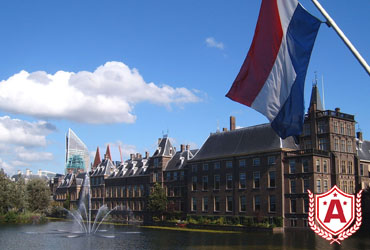 The Netherlands, located in Northwestern Europe, is a small yet dynamic country known for its picturesque landscapes, progressive mindset, and rich cultural heritage. With a population of around 17 million, the Netherlands offers a unique blend of historical charm and modern innovation. The country is renowned for its iconic tulip fields, windmills, and picturesque canals. The capital city, Amsterdam, with its historic canal district, vibrant cultural scene, and world-class museums like the Rijksmuseum and Van Gogh Museum, is a major attraction for visitors. Other cities like Rotterdam, The Hague, and Utrecht offer a mix of modern architecture, bustling markets, and cultural events. The Netherlands is often referred to as the "Bicycle Capital of the World" due to its extensive cycling infrastructure and cycling culture. Cycling is not just a means of transportation but also a way of life in the Netherlands, allowing residents and visitors to explore the country's beautiful landscapes, including its national parks, coastal dunes, and charming countryside. The Dutch are known for their progressive mindset and commitment to sustainability. The Netherlands is a global leader in renewable energy, with initiatives like wind farms and solar power projects. The country also prioritizes environmental conservation and has implemented measures to combat climate change and protect its natural resources. The Netherlands has a well-respected education system and is home to several top-ranked universities. Dutch universities attract a large number of international students who benefit from high-quality education and a wide range of study programs taught in English. The country's academic institutions foster an innovative and research-oriented environment. Dutch culture is rich and diverse, shaped by historical influences and global connections. The Netherlands is famous for its art, particularly the works of renowned painters such as Rembrandt and Vermeer. Dutch cuisine offers a variety of delicious treats, including cheese, stroopwafels, and herring. The Dutch also celebrate cultural events and festivals, like King's Day and Carnival, with enthusiasm and joy. In addition, the Netherlands is known for its inclusive and tolerant society. It embraces diversity and has been at the forefront of social progress, including the legalization of same-sex marriage and the promotion of gender equality. In summary, the Netherlands with its captivating landscapes, cultural treasures, and progressive mindset offers a delightful experience for residents and visitors alike. Whether you're exploring historic cities, cycling through scenic routes, or immersing yourself in Dutch culture, the Netherlands is a country that combines tradition with innovation in a truly remarkable way.
The Netherlands, located in Northwestern Europe, is a small yet dynamic country known for its picturesque landscapes, progressive mindset, and rich cultural heritage. With a population of around 17 million, the Netherlands offers a unique blend of historical charm and modern innovation. The country is renowned for its iconic tulip fields, windmills, and picturesque canals. The capital city, Amsterdam, with its historic canal district, vibrant cultural scene, and world-class museums like the Rijksmuseum and Van Gogh Museum, is a major attraction for visitors. Other cities like Rotterdam, The Hague, and Utrecht offer a mix of modern architecture, bustling markets, and cultural events. The Netherlands is often referred to as the "Bicycle Capital of the World" due to its extensive cycling infrastructure and cycling culture. Cycling is not just a means of transportation but also a way of life in the Netherlands, allowing residents and visitors to explore the country's beautiful landscapes, including its national parks, coastal dunes, and charming countryside. The Dutch are known for their progressive mindset and commitment to sustainability. The Netherlands is a global leader in renewable energy, with initiatives like wind farms and solar power projects. The country also prioritizes environmental conservation and has implemented measures to combat climate change and protect its natural resources. The Netherlands has a well-respected education system and is home to several top-ranked universities. Dutch universities attract a large number of international students who benefit from high-quality education and a wide range of study programs taught in English. The country's academic institutions foster an innovative and research-oriented environment. Dutch culture is rich and diverse, shaped by historical influences and global connections. The Netherlands is famous for its art, particularly the works of renowned painters such as Rembrandt and Vermeer. Dutch cuisine offers a variety of delicious treats, including cheese, stroopwafels, and herring. The Dutch also celebrate cultural events and festivals, like King's Day and Carnival, with enthusiasm and joy. In addition, the Netherlands is known for its inclusive and tolerant society. It embraces diversity and has been at the forefront of social progress, including the legalization of same-sex marriage and the promotion of gender equality. In summary, the Netherlands with its captivating landscapes, cultural treasures, and progressive mindset offers a delightful experience for residents and visitors alike. Whether you're exploring historic cities, cycling through scenic routes, or immersing yourself in Dutch culture, the Netherlands is a country that combines tradition with innovation in a truly remarkable way.
Is the Netherlands Safe for Students?
Yes, the Netherlands is extremely safe for international students to pursue their dream degrees.
What Is The Crime Rate In The Netherlands?
The crime rate in the Netherlands is very low.
How Much Does It Cost To Pursue A Degree In The Netherlands?
On an average basis, it costs €8,024 (£7,138) for EEA/EA students and €24,000 (£21,349) for non-EEA/EU students to study in the Netherlands.
Are The Career Prospects In The Netherlands Good For International Students?
Yes, international students get very good career prospects after completing their studies in the Netherlands.
Are IELTS And TOEFL Scores Required To Study In The Netherlands?
Yes, IELTS and TOEFL scores are mandatory for studying in the Netherlands.
Get free 1-on-1 counselling with our experts

If you are looking for a new job in Germany, or if you are an expat considering ...
April, 19 2025
Germany is one of the most attractive places for international students due to i...
April, 19 2025
This Blog post will provide important insights into student’s life. This blog ...
April, 19 2025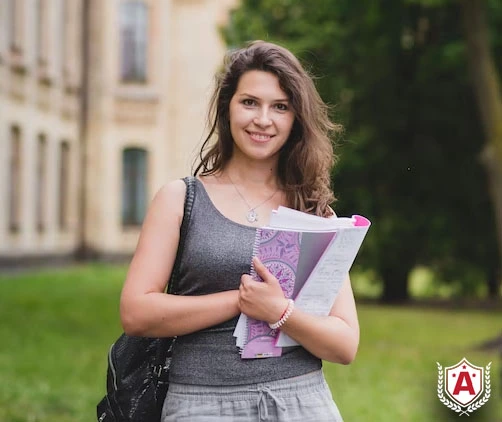
Germany offers a wide range of opportunities for students to pursue higher studi...
April, 18 2025
If you're looking for a way to make some extra cash while you're studying, Germa...
April, 18 2025
There are a variety of scholarships available in Germany, from government-sponso...
April, 18 2025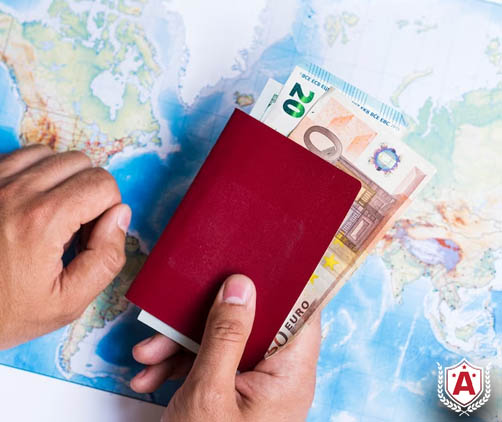
Germany is a popular destination for students seeking a quality education at an ...
April, 18 2025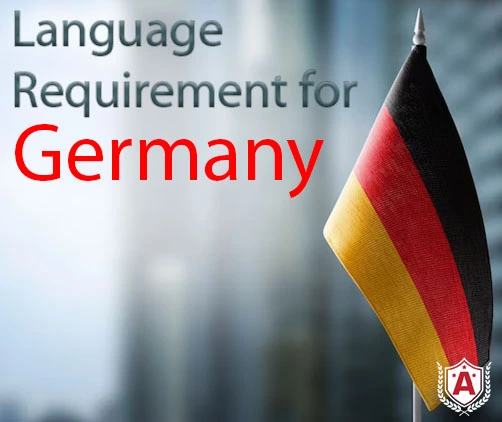
The German language is one of the official languages of Germany so proficiency i...
April, 18 2025